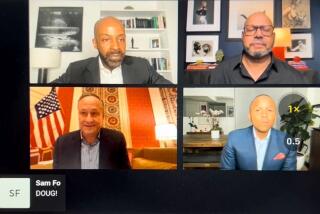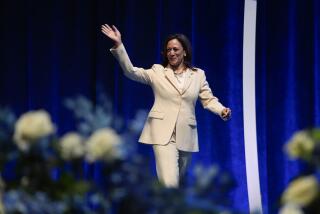Baker and Bush: What’s a Crisis Between Friends? : Policy: As the ‘First Friend,’ Secretary of State James Baker could do no wrong--but the White House drew the line at foreign-policy free-lancing.
The embattled leader sits in the bunker, surrounded by a small team of devoted aides who help him keep the world at bay, thinking about his enemies in the White House and fondly recalling the wonderful days before August when everything was going so well.
No, not Saddam Hussein. These are grim times for Secretary of State James A. Baker III. His pro-Soviet policies are becoming an embarrassment and his clumsy handling of the Middle East has spilled over into a disavowed joint communique with the Soviets that blindsided President Bush, infuriated Israel and has critics in the National Security Council and among the State Department’s excluded career diplomats gloating.
This Ivy League Texas lawyer once bestrode Washington like a colossus. Presidential campaign manager for Gerald R. Ford, chief of staff in the Reagan White House, and then Treasury secretary, and now secretary of state to his old tennis partner, George Bush, Baker was the Republican with the golden touch.
He became the Bush Administration’s leading advocate of cooperation with the Soviets, played a crucial role in midwifing German unification and was the architect of the sudden sense of global understanding that sustained the World Economic Summit in his home town of Houston last July. That was the high point.
But with the Gulf, Baker’s stewardship of U.S. foreign policy began to go awry. First, there was the policy, correctly expressed to Hussein by the U.S ambassador on the eve of invasion, that the United States, “took no position on inter-Arab border disputes.” This left the State Department looking uncomfortably like an accessory to invasion.
Baker did not react well after the invasion, remaining on vacation on his Wyoming ranch--where he had been fishing with his new chum, Soviet Foreign Minister Eduard A. Shevardnadze. Meanwhile, Washington grumbled that he was sulking.
Then came the second mistake. When Baker returned, Bush made him the point man to convince Congress that the Administration did indeed have a coherent Gulf policy. Baker had spent the 1980s soothing congressional egos with plausible testimony. Not this time.
The problem was that Baker barely knew what he was talking about. Iraq, like most of the rest of the world, seldom appeared on Baker’s radar screen. Almost as soon as Baker set up shop in the State Department, he focused on the big issues of U.S.-Soviet relations.
For the first 18 months of the Bush Administration--and perhaps even now--this was the right priority. Baker was probably right to ignore China, where Bush himself wanted to be the lead player, and Japan, India, Africa and South America. But Baker’s operating system left him vulnerable to a sudden crisis exploding elsewhere. Thrown off balance by the Gulf crisis, Baker was confident his plunge into Soviet and European affairs would pay off with the European summit last November. Certainly it helped achieve crucial Soviet compliance with sanctions and military force against Iraq in the U.N. Security Council.
Baker became the Administration’s leading perestroika booster--even vetoing a skeptical speech by an NSC official. When Shevardnadze resigned, warning of a return to dictatorship, and tanks rolled into Lithuania, Baker’s investment in perestroika became as dated as a Michael Milken junk bond.
Only slightly deterred, Baker tried last month to build a new personal relationship with Shevardnadze’s successor, Alexander A. Bessmertnykh. By the Gorbyphile standards of 1989, it worked. Baker headed off the threat of a unilateral Soviet cease-fire proposal at the United Nations. He wrung from the Soviets a promise to start withdrawing extra troops from the Baltic states. U.S.-Soviet relations were back, shakily, on track.
But by the Gorbyphobe standards of 1991, Baker paid a price: embarrassment. The joint U.S.-Soviet communique--released just before Bush’s State of the Union address--promised to stop the bombing if Iraq announced it would withdraw from Kuwait, and announced a postwar effort to bring a wider peace to the Middle East. It looked suspiciously like the “linkage” between Kuwait and Palestine that the White House had spent months denouncing.
“He’s never mad at me,” Baker said the next day, when asked if Bush was angry at this policy free-lancing. Maybe so. But White House aides were furious. Washington’s nightmare--a policy war between State and the NSC--began to stir.
Three days later, Baker’s aides tried to take the heat off by leaking some of their initial conclusions on postwar planning. The NSC, who saw this as their plan, was once again furious.
For anyone but the “First Friend,” this would be critical. But Baker has been at Bush’s side since the Establishment Easterner re-invented himself as a self-made Texan oil tycoon. When Bush went through the tragedy of losing a daughter to leukemia, Baker was there. When Baker’s first wife contracted cancer, the Bushes helped haul him back from grief.
The two men like to present themselves as mirror images. Bush is the Ivy Leaguer turned Texan. And, ever since he lost his only bid for elective office in 1976, Baker overacts the part of the tobacco-chewing Texan who got a Princeton veneer but still wears cowboy boots.
In fact, in wealthy upbringing, education, marriages and taste, Baker is almost as convincing a patrician as Bush. To see them together is like watching an old married couple who communicate with winks, nods and half-finished phrases. And this is why the current disarray between the two is so disturbing.
Baker has in the past shown an uncanny understanding of the President’s mind, and the affair of the joint U.S.-Soviet communique is the first serious sign that the system is no longer functioning. While the White House is wholly intent on prosecuting the war, the Administration’s own internal policy-making machinery is breaking down.
Last week, in testimony before the House, Baker tried to redeem his stewardship with a thoughtful assessment of postwar Gulf policy. It included a far-sighted suggestion of U.S. participation in the rebuilding of Iraq. But he was unrepentant on his faith in Soviet reform, saying, “We must be careful not to jump to premature conclusions.”
But this is part of wider dysfunction within the Bush Administration. Inspired by the diplomatic success of building an international coalition against Hussein, and intoxicated by Desert Storm’s vast military power, the Bush White House is thinking imperially.
Baker, who saw the humbling of the dollar as Treasury secretary in the 1980s, has a more realistic, and more modest, vision of America’s future. He had laid out America’s constrained role in a world it no longer dominated in a 1986 speech.
“Our new leadership is more in the manner of an architect and builder, patiently and tenaciously pursuing a vision of economic growth and prosperity, trying to persuade others what may be accomplished while contributing our fair share,” he noted.
The real challenge of Baker’s job will come after the Gulf War, when a regional peace must be built and the massive challenge of a disintegrating Soviet Union faced with increasingly constrained U.S. resources. The “First Friend” will need to draw on 30 years of intimacy to balance Bush’s imperious new confidence with his own cautious pragmatism.
“Don’t worry,” says a friend who knows them both. “Just watch them play tennis together--Baker taking care of the baseline, while Bush volleys like a tiger at the net. This is a partnership which goes back too long for little things like world crises to upset it.”
More to Read
Get the L.A. Times Politics newsletter
Deeply reported insights into legislation, politics and policy from Sacramento, Washington and beyond. In your inbox three times per week.
You may occasionally receive promotional content from the Los Angeles Times.






